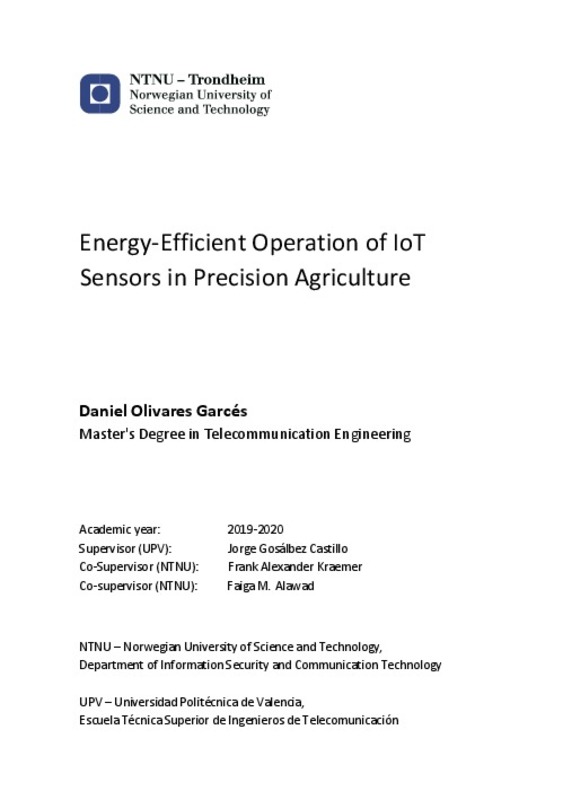JavaScript is disabled for your browser. Some features of this site may not work without it.
Buscar en RiuNet
Listar
Mi cuenta
Estadísticas
Ayuda RiuNet
Admin. UPV
Operación energética eficiente en sensores IoT para agricultura de precisión
Mostrar el registro sencillo del ítem
Ficheros en el ítem
| dc.contributor.advisor | Gosálbez Castillo, Jorge
|
es_ES |
| dc.contributor.advisor | Kraemer, Frank Alexander
|
es_ES |
| dc.contributor.advisor | Alawad, Faiga
|
es_ES |
| dc.contributor.author | Olivares Garcés, Daniel
|
es_ES |
| dc.date.accessioned | 2020-10-19T15:47:30Z | |
| dc.date.available | 2020-10-19T15:47:30Z | |
| dc.date.created | 2020-07-07 | es_ES |
| dc.date.issued | 2020-10-19 | es_ES |
| dc.identifier.uri | http://hdl.handle.net/10251/152414 | |
| dc.description.abstract | [ES] Actualmente se están implementando sistemas basados en sensores IoT para automatizar o monitorizar diferentes procesos en la agricultura. Una de las principales limitaciones de estos sistemas es la duración y tamaño de las baterías, lo que aumenta su coste de mantenimiento e implantación. La mayoría de estos sistemas funciona con una frecuencia de muestreo fijada a al inicio. El objetivo principal del trabajo es la creación de políticas de muestreo inteligentes aplicadas a este tipo de sensores usados en agricultura, así como métodos para evaluarlas. Estas políticas dejarás de ser una frecuencia de muestreo fija y tratarán de adaptarse al parámetro estudiado para así evitar mediciones sin aporte de información valiosa y ahorrar energía. Una vez establecidas las políticas y los métodos de evaluación, se tratará de definir una serie de pautas o acciones que sirvan como base de un sistema dotado de inteligencia artificial y machine learning capaz de desarrollar sus propias políticas inteligentes de muestreo. Este trabajo está enfocado principalmente a sensores de humedad de suelo. | es_ES |
| dc.description.abstract | [EN] IoT technology is starting to play a key role in many fields, one of them is precision agriculture. Several kinds of sensors are helping farmers to check different parameters of their crops in real time, giving them a very useful decision support to know when irrigation is needed, detect plagues, etc. However, these sensors have a limited lifetime due to its battery or power supply limitations, moreover, in most cases the selection of the sampling rate (the parameter with highest influence in power consumption) is left to be set by the farmer, adding difficulty to the use. In general terms, this work aims to analyze moisture monitoring sensors and systems to obtain certain conclusions and rules to be used as base in the implementation of smart soil moisture sensors with adaptability and intelligence to auto determine when to measure, making them more efficient and easy to use. The first stage of this thesis will study the state of the art in smart agriculture, and more specifically the use of soil moisture sensors. Class, applications, price, autonomy and other qualities of the sensors will be studied, as well as opinions from farmers and smart irrigation companies to determine the ideal requirements in a possible smart system. After that, some experiments with commercial sensors and products will be held in order to obtain raw data to work with. The sensors will be placed in an experimental soil during several wet-dry cycles and configured with a high sampling rate storing all the data for future analysis, soil temperature will be studied at the same time. The analysis will reveal how to reduce the number of samples without reducing the utility of the system, presumably that means to reduce the sampling rate when moisture values are not significant and increase it when they are close to critical values for the farmer (irrigation threshold, over wetting, etc.) but conclusions won t be clear until the analysis is done. Finally, possible improvements in power consumption will be accounted to discuss possible implications of this (better autonomy, smaller devices etc.). | en_EN |
| dc.format.extent | 110 | es_ES |
| dc.language | Inglés | es_ES |
| dc.publisher | Universitat Politècnica de València | es_ES |
| dc.rights | Reserva de todos los derechos | es_ES |
| dc.subject | IoT | es_ES |
| dc.subject | Sensores | es_ES |
| dc.subject | Eficiencia | es_ES |
| dc.subject | Energética | es_ES |
| dc.subject | Operación | es_ES |
| dc.subject | Inteligente | es_ES |
| dc.subject | AI | es_ES |
| dc.subject | Sensors | en_EN |
| dc.subject | Smart operation | en_EN |
| dc.subject | Energy-efficient | en_EN |
| dc.subject | Precision agriculture | en_EN |
| dc.subject.classification | TEORIA DE LA SEÑAL Y COMUNICACIONES | es_ES |
| dc.subject.other | Máster Universitario en Ingeniería de Telecomunicación-Màster Universitari en Enginyeria de Telecomunicació | es_ES |
| dc.title | Operación energética eficiente en sensores IoT para agricultura de precisión | es_ES |
| dc.type | Tesis de máster | es_ES |
| dc.rights.accessRights | Abierto | es_ES |
| dc.contributor.affiliation | Universitat Politècnica de València. Departamento de Comunicaciones - Departament de Comunicacions | es_ES |
| dc.contributor.affiliation | Universitat Politècnica de València. Escuela Técnica Superior de Ingenieros de Telecomunicación - Escola Tècnica Superior d'Enginyers de Telecomunicació | es_ES |
| dc.description.bibliographicCitation | Olivares Garcés, D. (2020). Operación energética eficiente en sensores IoT para agricultura de precisión. http://hdl.handle.net/10251/152414 | es_ES |
| dc.description.accrualMethod | TFGM | es_ES |
| dc.relation.pasarela | TFGM\129676 | es_ES |
Este ítem aparece en la(s) siguiente(s) colección(ones)
-
ETSIT - Trabajos académicos [2408]
Escuela Técnica Superior de Ingenieros de Telecomunicación






